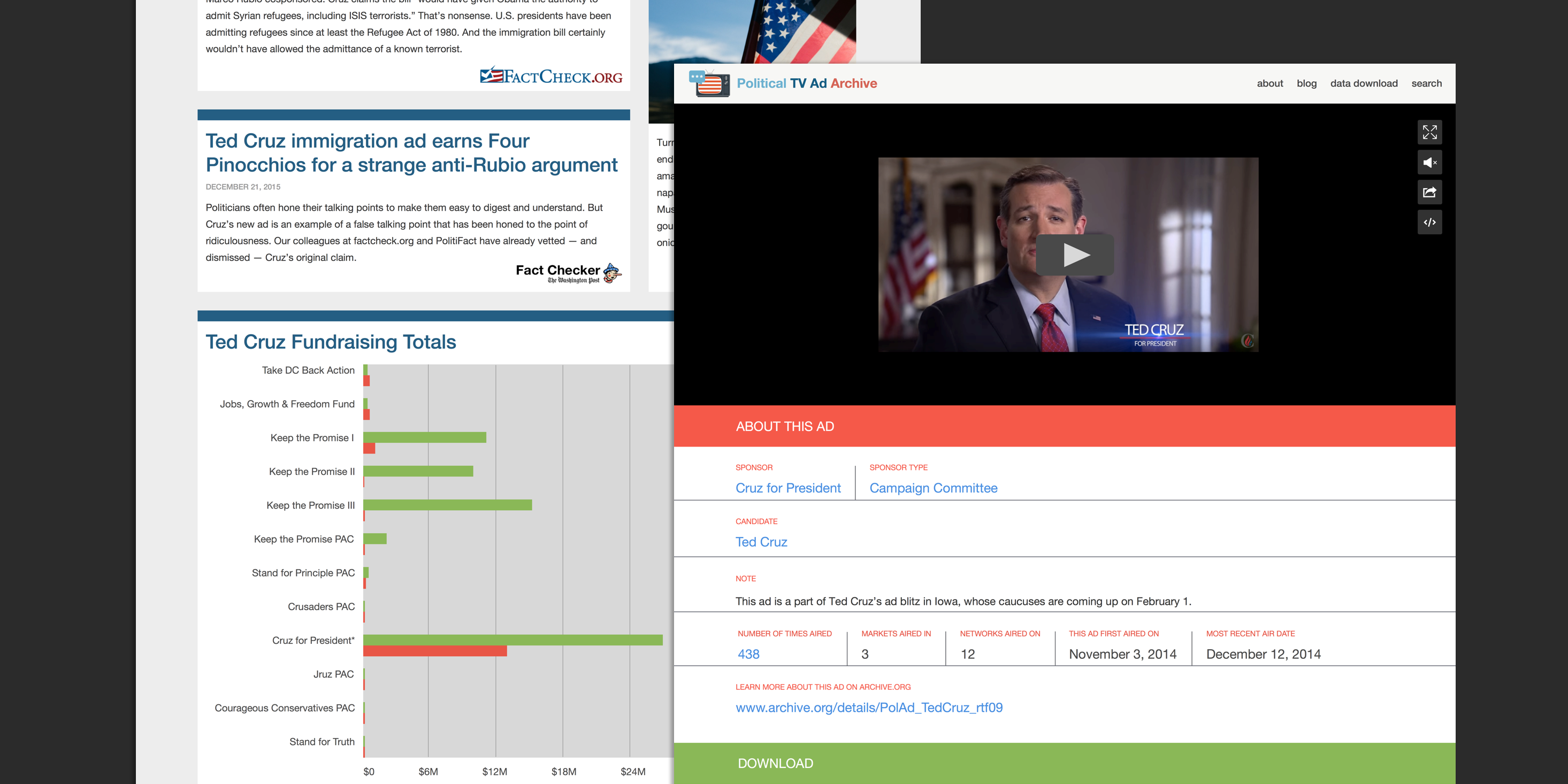
New, free website archives political TV ads in 2016 primaries married with fact-checking and reporting from award-winning journalism partners
After sifting through more than 100,000 hours of broadcast television coverage and counting, the Internet Archive today launches its new, free Political TV Ad Archive website —PoliticalAdArchive.org — with more than 30,000 ad airings archived. This new resource will bring journalists, researchers, and the public resources to help hold politicians accountable for the messages they deliver in TV ads.
Each ad is accompanied by underlying, downloadable data on how often it has aired, where, and when in 20 TV markets throughout eight key primary states. In addition, the site links to fact-checking and follow-the-money journalism by the project’s partners: the American Press Institute, the Center for Responsive Politics, the Center for Public Integrity, the Duke Reporters’ Lab, FactCheck.org, PolitiFact, and The Washington Post’sFact Checker.
The ads range from Democrat Bernie Sanders’ ad blanketing Iowa with more than 1,300 airings that proclaims him to be a “pragmatist”; to Marco Rubio’s proclamation that “this is the greatest country in the world, and acting like it,” which aired more than 1,700 times in Iowa and New Hampshire; to the negative ad sponsored by super PAC Right to Rise, which supports Jeb Bush, that takes a swing at rivals Donald Trump, Ted Cruz, and Marco Rubio in thirty seconds flat.
The ad collection also gathers instances where news broadcasts have played excerpts of ads or even entire ads as part of their reporting — in other words, “earned media.” For example, Trump’s first ad, which focused on immigration, was aired several times as part of news reports.
 On the new website, each ad is archived on its own page, along with downloadable metadata on how often the ad has aired, on which TV stations, where, and when. These data also include information on who is sponsoring the ad, the subject(s) covered in the ad, which candidates are targeted in the ad, and the type of legal designation of the sponsor — e.g., super PAC, campaign committee, 501(c), and so on.
On the new website, each ad is archived on its own page, along with downloadable metadata on how often the ad has aired, on which TV stations, where, and when. These data also include information on who is sponsoring the ad, the subject(s) covered in the ad, which candidates are targeted in the ad, and the type of legal designation of the sponsor — e.g., super PAC, campaign committee, 501(c), and so on.
“Public libraries are a cornerstone of democracy; by providing information to anyone who seeks it, they give citizens the ability to make better decisions,” said Brewster Kahle, founder and Digital Librarian of the Internet Archive. “We’re creating this library of political ads so that voters have some control over the messages that politicians and outside groups pile on at election time.”
“Before the primaries are over, the public in key primary states will be buried in campaign ads generating more heat than light. This new website will be a resource for journalists, academics, civic groups and the general public to have a better chance at separating lies from truths and learn who is paying for the ads,” said Roger Macdonald, director of the Television Archive for the Internet Archive.
Internet Archive senior engineer, Dan Schultz, an innovator in harnessing technology for fact checking, tapped an open source audio fingerprinting tool developed by Columbia University known as “audfprint” to track down airings of political TV ads in the television broadcast airwaves. He built on engineering created by Tracey Jaquith, architect of the TV Archive. The new system, whimsically named the “Duplitron,” is also open source and should prove useful in other video/audio analysis projects.
“Thanks to technological advances, we can find a copy of a political ad, create an unique fingerprint, and then match it to other segments of audio that share that same fingerprint. The result: we can figure out how many times ads have aired, where, and when,” said Schultz.
Key findings so far from the project’s journalism partners include:
- PolitiFact rated a claim in this Donald Trump campaign ad as “Pants on Fire” because it proclaimed that Trump would “stop illegal immigration by building a wall on our southern border that Mexico will pay for,” while showing footage not of Mexican immigrants, but rather of refugees streaming into Morocco that had been pulled from an Italian news network. See the ad here.
- FactCheck.org reported that a Hillary Clinton TV ad that claimed that drug prices had doubled in the last seven years was inaccurate: “A report, provided by her campaign, says brand-name drug prices on average have more than doubled. But more than 80 percent of filled prescriptions are generic drugs, and those prices have declined by nearly 63 percent, that same report says.” See the ad here.
- The Washington Post’sFact Checker gave four Pinocchios to a claim in an ad sponsored by Ted Cruz’s campaign charging that Sen. Marco Rubio, Fla., had compromised on the immigration issue. This claim comes from Cruz’ contention that Rubio supported a bill that would give “President Obama blanket authority to admit Syrian refugees…without mandating meaningful background checks…” The fact-checking group pointed to immigration experts who say this interpretation of the immigration bill in question is wrong. See the ad here.
- The Center for Public Integrity has reported that an ad targeting Trump, Rubio, and Cruz, sponsored by the super PAC Right to Rise, which supports Jeb Bush, was funded by “close confidants of Bush and his storied political family.” This includes scions of banks and equity firms. See the ad here.
- More than 80 percent of ads run in the 2016 GOP presidential primaries are sponsored by super PACs, according to the Center for Responsive Politics, up 71 percent over 2011 and a 12,000 percent jump over 2007. The analysis was done in conjunction with Wesleyan Media Project.
The Political TV Ad Archive is collecting television from key primary states before the primary or caucus in that particular state. Instances of airings captured by the website include both paid media and “earned media” — when TV news broadcasts air significant portions of ads while doing stories about them.
The Political TV Ad Archive is funded by the Knight News Challenge, an initiative of the John S. and James L. Knight Foundation. The Challenge is a joint effort of the Rita Allen Foundation, the Democracy Fund, and the Hewlett Foundation. Christopher Buck and Craig Newmark have made individual contributions to the project. In addition, the Internet Archive has received funding from the Democracy Fund to conduct joint trainings of journalists in key primary states in partnership with the American Press Institute. The launch event is co-sponsored by the National Press Club Journalism Institute.
“This new tool has the potential to bring more accountability to the voting process, providing a resource to uncover and verify important information in the lead up to the 2016 elections,” said John Bracken, Knight Foundation vice president for media innovation.
This new tool has the potential to bring more accountability to the voting process, providing a resource to uncover and verify important information in the lead up to the 2016 elections,” said John Bracken, Knight Foundation vice president for media innovation
Very interesting. Why not just use a sub-domain for this website?